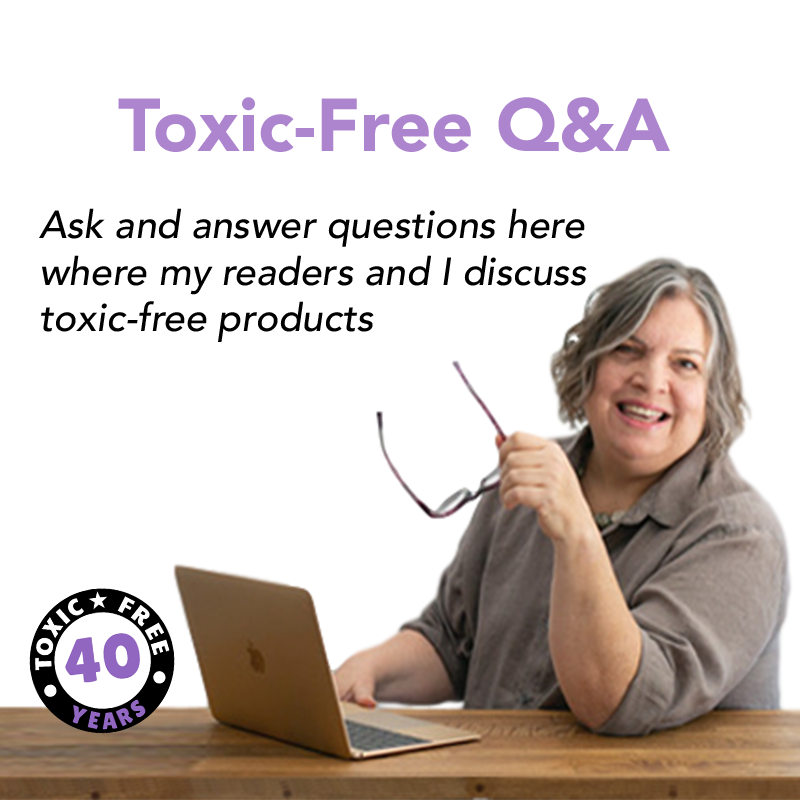
Submitted questions will be posted with my response by the following Tuesday or before.
Submitted comments will be moderated and approved within 24 hours.
Safer synthetic carpet?
Question from Kmdegroot
We need to replace the carpet on our stairs. The rest of the house has wood floors, but I prefer padding on the stairs for safety. Wool isn’t in the budget. Are there safer synthetics? Where does one buy them and what questions do I need to ask? Thanks so much!
Debra’s Answer
Concrete Floor finishing products?
Question from Hope Fox
Hi there,
I need to finish two concrete slabs (upstairs and downstairs – yes we have a concrete floor upstairs!) in our close-to-being-finished new healthy home. I would appreciate some feedback on two products, AcriSoy sealant and any sealant designed to go on top of diamond-polished floors.
Downstairs (kitchen, living room, bathroom) Slab: After reading great things about the durability and healthyness of diamond polished floors (supposedly no maintanence for decades!) we went ahead with it as a DIY project – professionally diamond polished concrete services are super expensive. After a bit of a learning curve, the floor is polished, and looks lovely. The densified, polished surface is naturally somewhat water-repellant, but can still stain if the source of the stain is not cleaned up right away. Living with two young, messy boys, this is bound to happen. I am trying to decide whether to use an additional sealant, and if so, which one. It would need to be designed to seal on top of diamond-polished floors, since there will be minimal penetration posssible with this floor treatment. This is the sealant from the company that we got our concrete densifier from. What do you think of the safety of this product from an MCS perspective, based on its MSDS? Our move in date is aprox 2 months from now.
http://www.xtremeharddensifier.com/uploads/Shield.pdf
The upstairs slab (bedrooms, bathrooms, laundry room) need to be finished differently. Somehow the waterproof additive Xypex was added to this pour in addition to the pour for the walls, where it was supposed to be, so we could not diamond polish it. The waterproofing does not protect it from stains, necessarily. We were thinking of sealing it with Acrisoy…. any thoughts, experience?
Debra’s Answer
The AcriSoy looks good to me on paper. Has anyone tried it?
The other one I wouldn’t use. It says it is not hazardous under normal conditions, but contains Dipropylene Glycol Normal Butyl Ether which is pretty toxic when you are applying it. It’s probably OK once it dries, but the coating is acrylic plastic and I’d prefer another material for you.
Cleaning top loading HE washer
Question from KOS
Hi Debra, Just purchased a Kenmore HE top loading washer. Instructions say to clean it monthly with bleach (it has a clean cycle to do this). I’m obviously not going to use bleach. Any suggestions on what to use instead? Just ordered your new book – eager to read it! Best, Kelly
Debra’s Answer
I don’t have a top loading washer so I don’t have any experience with this. Readers, what are you cleaning yours with besides bleach?
1950’s Fire King Milk Glass Dishware: Is it Lead Free?
Question from m1021
I’ve always liked milkglass, and saw some on Etsy from the 1950’s (I think, given the stamp and what google says about the date stamp).
From all what I can learn through google, there was arscenic in milk glass back in the 1800’s, and then they stopped that and used lead for awhile instead to acheive the same milky look, up to the early 1900’s.
But the info seems to stop there. So the milkglass I’m drooling over from the 1950’s….anyone know if that’s safe? It’s stamped “Fire King,” and I do know that Fire King/Anchor Hocking glass is currently safe nowadays. But does that give me any assurances for old stuff?
Debra’s Answer
Readers?
Nord Piano Keybed lubricant
Question from reelfood
Hi Debra, Thanks for your site!
I recently purchased a Nord piano that has a Fatar keybed made in Tunisia and they are using some kind of chemical on it that I am reacting to. I chose this piano because it was made without plywood (unlike most other major brands) so was very surprised and disappointed that there was an issue with it. My choices now are to get a Roland keyboard that has the plywood or get a used Nord that has gassed off for 6-8 mos or more.
My biggest question is will the used Nord, even though it may not smell as bad still be insidiously effecting me ? I would have to have it shipped across the country to even tell if I can tolerate it. I have played a Roland and even though it has the plywood, I did not notice a reaction to it. I did not buy it because even though I couldn’t smell it, I figured it must be gassing off formaldehyde. Perhaps someone knows of a digital piano/keyboard that has no plywood? Thanks for any thoughts you or your readers have.
Debra’s Answer
Readers, and suggestions?
Tampons
Question from Adrian
Hi, I was wondering if tampons are one of those things that should be organic. I usually do buy them, however my daughter was recently given a huge box of regular ones from a bulk store and don’t know if we should use them. Thank You, Adrian
Debra’s Answer
Definitely tampons should be organic and unbleached, if paper. Ordinary bleached tampons made from paper usually contain residues of dioxin from the paper bleaching process (chlorine bleach combines with wood lignins in the paper to form dioxin, one of the most toxic chemicals on earth). Dioxin can be released from the tampons and be absorbed through the skin, which is particularly vulnerable in that delicate area.
I would toss those tampons.
Not so Stainless Steel cookware
Question from cymering
Dear Debra, I know that you don’t use stainless steel, but maybe you can help me with this. I had the same pots and pans for years and I never had eny problems. Recently they started showing rainbow or some dark stains. I bought new pots, and they get stained too. I have recently change to organic rice and pasta, but the some stains appear with other food too, that I have not change. On the Web, some say that I can clean using lemon, but will this not affect the metal? Are the pots still safe to use? Thank you.
Debra’s Answer
Well, first, you are right I don’t recommend stainless steel because it can leach heavy metals if you scratch it, as when you use metal utensils.
Readers, any thoughts on this?
Toxic-free Storage Solution
Question from Donna L
I know I’m way over thinking this and even thought twice about sending this question, but I need help. My son had allergies, asthma and chemical sensitivities (I say had because after three years of detoxing our home, he hasn’t had any flare-ups in quite a while.)
I am trying to find a toxic-free solution for storing his socks, pajamas, underclothes, etc. I decided completely against a dresser, because even with solid wood ones, the drawers and backings are made of plywood, and I can’t afford the ones that aren’t. (For his bed and nightstand, we bought solid wood and had it painted with AFM Safecoat, but it was an ordeal finding someone in our area to do this.)
I thought about metal shelves in his closet, but am worried about epoxy and chrome coatings, as well as their being EMF conductors.
I ordered an organic cotton, three pocket wall organizer from 3Sprouts, but when it arrived it was very stiff like it had been treated with something. (Is anyone familiar with 3Sprouts?)
Right now, this clothing is in a wicker basket I have lined with a cotton towel, setting on his bathroom counter, but my husband is tired of looking at it. Any suggestions? And as always, thank you!
Debra’s Answer
Readers, what do you suggest?
I have my clothing in solid wood dressers.
Non-toxic hair dye
Question from Susan NYC
Hello Debra, I’m trying to figure out the best possible hair coloring to use–actually I need to cover gray:) I’m very sensitive to chemicals and have other allergies, as well as sensitive skin. I’m wondering what would be the mildest option for me. I have reddish-brown hair naturally. Thank you for all you do! Susan
Debra’s Answer
Readers, your suggestions?
I haven’t used any of the natural hair dyes, so can’t vouch for their mildness.
I get my hair hightlighted at an organic salon with All-Nutrient Organic Hair Color and I am very happy with the results.
Here are some other posts from this blog about hair color:
Linseed Oil on Brick
Question from InessaM
I am in the process of buying a house. Current owner used linseed oil as a sealer on all the floors in the house (all brick) and I am having really hard time with the fumes.
Does anyone know if the I can either removed it or seal it with another product?
Debra’s Answer
Readers, any suggestions?
I did a little research on this and found that linseed oil is extremely difficult to remove, even with very toxic chemicals, and brick is very porous, so that makes it even more difficult.
It is also difficult to seal because many finishes will not stick to the oily surface.
If you must buy this house, my recommendation would be to cover the floors with a physical barrier, such as heavy duty foil-backed paper, and then lay a new floor of your choice on top of that. Cement would also block the fumes–put a skim coat of cement over the brick and then use the cement floor as your floor or lay flooring over that.







